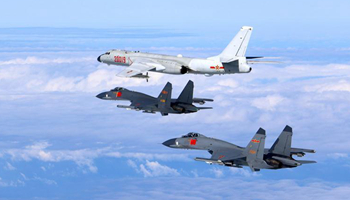
Chinese Foreign Minister Wang Yi answers questions on China's foreign policy and foreign relations at a press conference for the fifth session of the 12th National People's Congress in Beijing, capital of China, March 8, 2017. (Xinhua/Li Xin)
BEIJING, March 8 (Xinhua) -- The world has come to a crossroads in 2017, as globalization backpedaled in America and Europe while tensions continued to brew on the Korean Peninsula and some other places.
Chinese Foreign Minister Wang Yi on Wednesday reassured the world that China will continue to be an anchor of stability, an engine of global growth, while championing peace and contributing to multilateral global governance.
At a press conference on the sidelines of the annual national legislature session, Wang offered China's solution to the world's hot issues, which include dealing with the Trump administration, de-escalating tensions in Northeast Asia, supporting European integration, and ensuring lasting stability in the South China Sea.
The foreign minister said Chinese diplomats have risen to challenges and broken new ground, under the strong leadership of the Communist Party of China (CPC) Central Committee with Xi Jinping as the core.
He summed up Chinese diplomacy with three key words: vision, initiative and consistency.
VISION
Chinese diplomacy's new vision, put forward by Xi, features dialogue over confrontation, partnership over alliance, forging win-win cooperation, and jointly building a community of shared future for all of mankind.
Wang said this vision rises above the old approach of zero-sum games, and can be of great significance to the world.
Taking a question on China-U.S. relations, Wang said bilateral ties are "transitioning steadily and developing in a positive direction."
Wang said a "very important" phone conversation between Xi and Trump has set the direction and paved the way for China-U.S relations. The two sides are now communicating on future exchanges between their presidents.
"There is no reason why China and the United States cannot become excellent partners," Wang said.
Su Ge, president of the China Institute of International Studies, said China's preference for cooperation over confrontation is a break from Cold War mentality, which has led to conflicts between traditional and rising world powers in the past.
"The approach is an innovation, reflecting the philosophy that countries around the world are tied together and need to march forward through thick and thin," he told Xinhua in an interview.
Over the past year, tensions also calmed down visibly in the South China Sea, with ties between China and the Philippines notably improving.
Wang said since Philippine President Rodrigo Duterte came into office, the Southeast Asian country has extended a hand of goodwill.
"China, of course, will embrace it with open arms of cooperation," he said.
On Africa, Wang said there will be no weakening in China's support no matter how the international situation or world economy may evolve. In 2015, China announced 60 billion U.S. dollars funding support for the continent. The support is being implemented through phases.
INITIATIVE
China in 2013 proposed the Belt and Road Initiative, aiming to build a modern trade and infrastructure network connecting Asia with Europe and Africa along ancient Silk Road routes.
It has since won support from over 100 countries and international organizations, with nearly 50 cooperation agreements signed between governments.
The initiative made progress at a time when the world's traditional multilateral mechanisms are feared to have lost steam.
Wang said it has become the most popular public goods initiative and its implementation has opened a new chapter of openness and win-win cooperation.
China will host the Beijing Belt and Road Forum for International Cooperation in May, with attendance of more than 20 heads of state and government, over 50 leaders of international organizations, and more than 100 ministerial-level officials among the 1,000-plus delegates, he said.
This year, China also serves as the rotating chair of BRICS and will host the bloc's ninth leaders' summit in September.
Wang noted with optimism that the mechanism will not lose its luster.
It will shine more brightly if its members stay united, he added.
According to estimates, the share of BRICS gross domestic product in the world economy stood at 21.3 percent in 2013. On purchasing power parity terms, the bloc's economy reached 30 trillion U.S. dollars that year, tailing only slightly behind that of the G7.
"The BRICS countries are like five fingers: short and long if extended, but a powerful fist if clenched together," Wang said, citing remarks by Xi.
CONSISTENCY
BRICS is not the only multilateral mechanism China supports. Wang reaffirmed that China champions multilateralism, openness and inclusiveness amid a growing backlash against globalization and rising protectionism.
"In the face of skepticism over the existing international order and system, we have always called for maintaining it, and where necessary, improving it," Wang said. "The consistency and continuity of China's diplomacy are its due responsibilities as a large country."
The foreign minister also highlighted consistency in Chinese diplomacy, saying that China has adhered to the path of peaceful development in the face of instability and conflicts.
On the Korean Peninsular, where the Democratic People's Republic of Korea (DPRK) traded missile launches with large-scale military drills held by the United States and Republic of Korea (ROK).
Wang compared the two sides to "two accelerating trains, coming toward each other."
"Are the two sides really ready for a head-on collision?" Wang asked. "The priority is to flash the red light and apply the brakes."
China proposed "double suspension" to defuse the looming crisis -- the DPRK suspending its nuclear and missile activities while the United States and ROK ceasing war games.
China is willing to be a "railway switchman" to switch the issue back to the right track, he added.



















